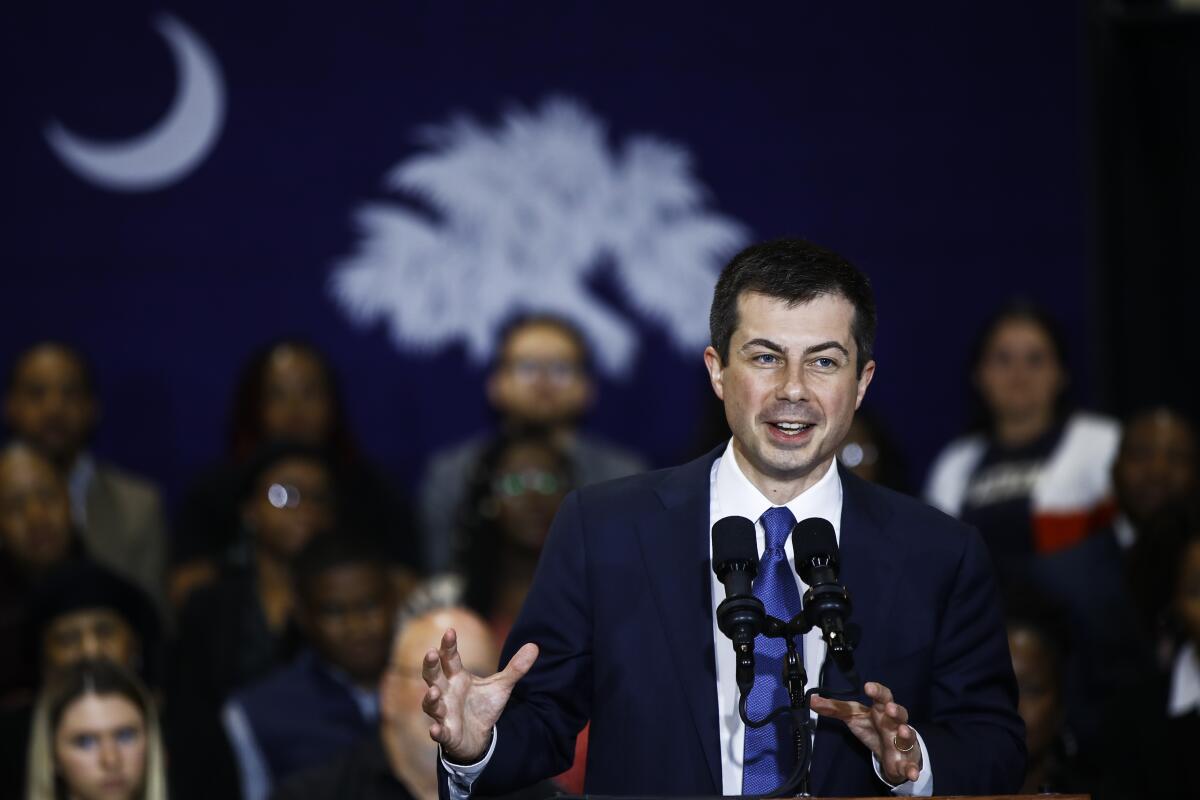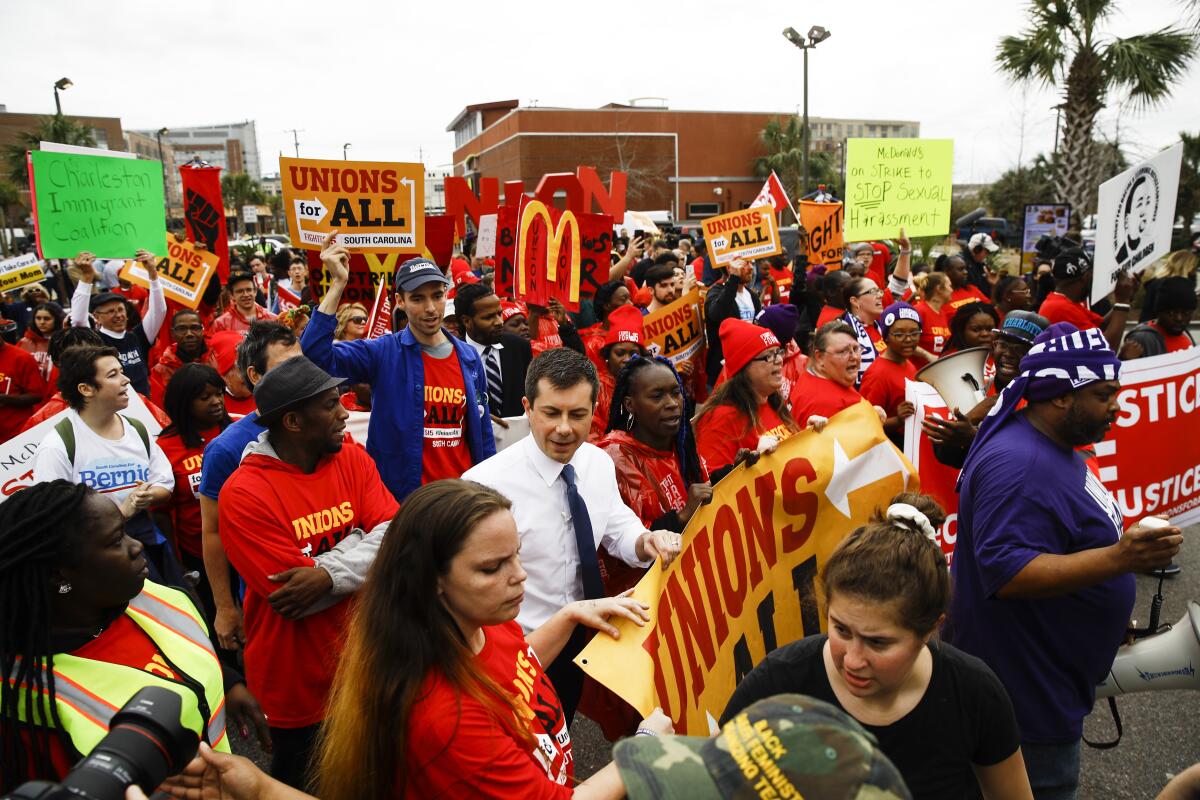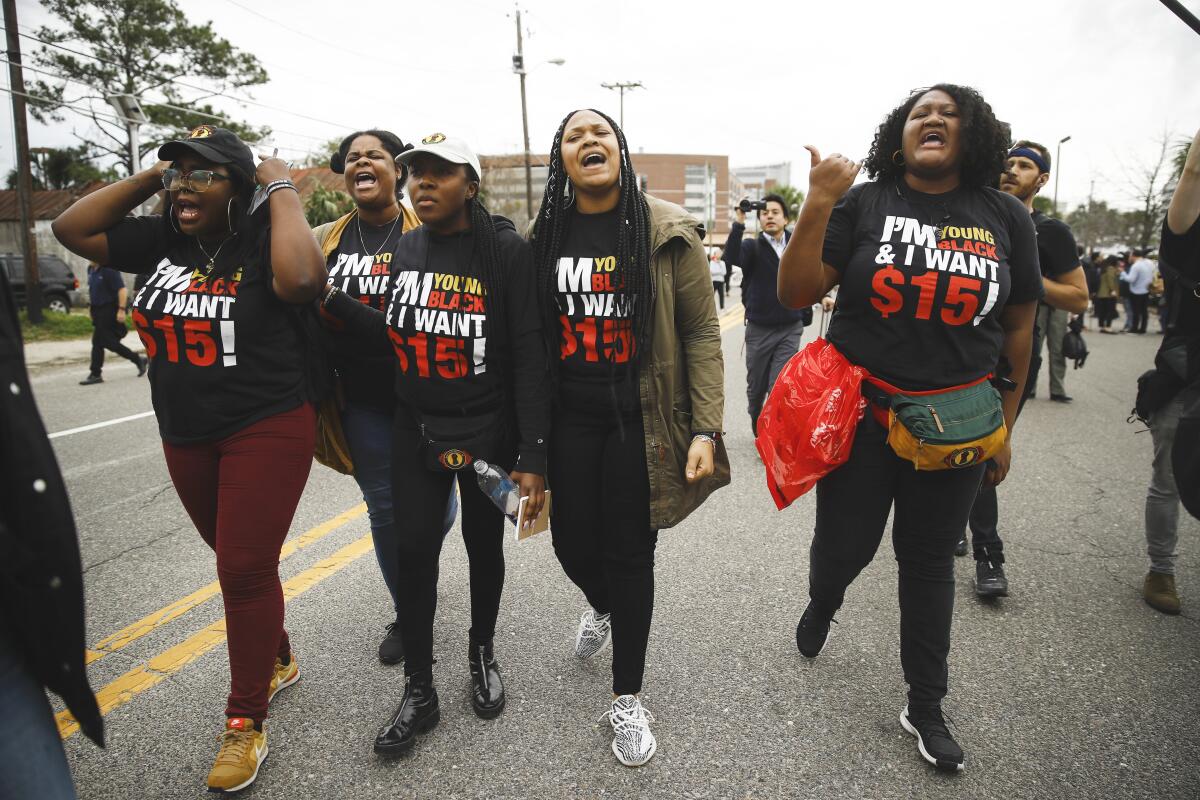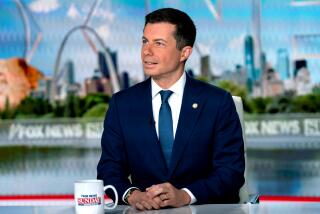Inside Pete Buttigieg’s last-ditch effort to win black voters in South Carolina

- Share via
CHARLESTON, S.C. — Pete Buttigieg has a serious problem going into South Carolina’s Democratic primary on Saturday: Black people account for about three-fifths of the party’s voters here, but many don’t know who he is, and a vocal share of those who do don’t like him.
The former mayor of South Bend, Ind., does have his supporters, including a group called African Americans For Pete. They sing his praises in town halls, lauding his mayoral record and an agenda to address systemic racism that is named for the 19th century black abolitionist and statesman Frederick Douglass.
But for most black voters, Buttigieg largely remains a nonfactor among the Democrats on the ballot. All week, since Saturday’s Nevada caucuses, he’s been in a sprint of sorts to catch up — dashing to Columbia, Greenville and Charleston, and planning to be in Sumter and Fairfax on Friday.
While the 38-year-old candidate made an impressive showing early in the nominating contests, virtually tying Vermont Sen. Bernie Sanders in Iowa and coming in a close second to him in New Hampshire, both states’ electorates are overwhelmingly white. Nevada, with a significant Latino population, was Buttigieg’s first test in a more diverse state, and he finished a distant third.
South Carolina, however, poses an even bigger challenge. A Marist/NBC poll that was completed Feb. 21 found Buttigieg had support of just 4% of likely black voters while former Vice President Joe Biden, the leader, had 32% and Sanders was next with 22%.
Todd Shaw, a political science professor at the University of South Carolina, attributed Buttigieg’s low standing to apprehension among black voters unfamiliar with him.
“He’s having to put his lack of name recognition, and the fact that he’s much younger and has only been mayor, against more formidable resumes including Sanders, [Sen. Elizabeth] Warren and Biden,” Shaw said. “Folks are unlikely to give him high marks because of this.”
Kendall Deas, a political science professor at the College of Charleston, echoed Shaw’s analysis, saying Buttigieg is “not a known element.” But Deas also noted that Buttigieg got a rough start in the state.
He recalled that last June, Buttigieg left early from Rep. James E. Clyburn’s “World Famous Fish Fry,” a traditional must-stop for candidates to meet Democratic voters, hosted by the state’s highest-ranking elected black official. He was still South Bend’s mayor at the time, and had to go home to deal with the fallout of a white police officer’s fatal shooting of a black man.
Deas said it hurt Buttigieg to have to leave an event “that is crucial for Democratic candidates to introduce themselves to people in the community.”
Clyburn, the third-ranking House Democrat and a civil rights leader, endorsed Biden this week, dealing a blow to the efforts of Buttigieg and other Democrats to woo black voters.
Yet Buttigieg has kept trying. He joined a picket line for a higher minimum wage and has spoken at town halls and churches, often impressing attendees with his tranquil demeanor and thoughtful remarks.
On Sunday morning, he spoke before a crowd of at least 300 at First Baptist Church of James Island, not far from downtown Charleston, and addressed systemic racism in the penal system and the abnormally high rate of maternal mortality among black women.
“When I’m asking voters, and in particular black voters, to trust me in this election, that is asking somebody who has perhaps never met me to trust me with their lives,” he said. “So many black lives are at stake in decisions that are being made right now in those big white buildings in Washington, D.C.”
Faith Mckelvey, a 54-year-old inventory-control technician who was unfamiliar with Buttigieg, was impressed. She seemed to take in every word of his speech, and after the service said she remained undecided but was “leaning towards Pete.”
“I thought his speech was very good,” Mckelvey said, and “very interesting, very educational. Everything he said was actually true.”
Wilburn Gilliard was similarly impressed but not sold. Buttigieg’s speech, he said, “covered a lot of items that’s pertinent to us as black folks, and as Americans in general.”
The 73-year-old retired engineer said Buttigieg’s youth is also appealing: “I feel we need some younger folks in office.” Gilliard didn’t rule out voting for 77-year-old Biden, though he is opposed to 78-year-old Sanders.
“It was nice to hear him personally,” Gilliard said of Buttigieg. Most voters, of course, won’t have that opportunity, and Buttigieg has limited resources to introduce himself through advertising. Earlier this week, however, his campaign released statewide television and digital ads targeting black voters.
Buttigieg has made multiple appearances in Charleston, the state’s largest city. Perhaps the most lively engagement occurred Monday afternoon at a picket line where he joined nearly 100 protesters to demand a $15-an-hour minimum wage for McDonald’s cooks and cashiers.

Buttigieg, who was among the few white demonstrators in the crowd, helped hold a “Unions for All” banner at the head of the crowd, which chanted, “We work, we sweat, put $15 on our check.”
As the crowd rounded the drive-through window, about 10 people from an activist group, the Black Youth Project, peeled off and began a competing chant: “Pete can’t be our president! Where was $15 in South Bend?”
“It’s why we’re here, guys,” a Buttigieg staffer replied. “It’s why we’re here.”
Mika Gadsden, a 38-year-old radio show host and local organizer with the group Black Voters Matter, said in an interview, “We’re here to support the workers that are fighting for a fair and equitable wage. But what we’re not here for is Mayor Pete, who just showed up for a photo-op.”
A Buttigieg aide said the candidate was invited to the protest.
Gadsden also noted, as some of the other protesters had, that South Bend does not have a $15 minimum wage. However, Indiana law bars local governments from instituting a citywide minimum wage at private businesses. Buttigieg was part of a successful effort to raise the minimum wage for city employees, to $10.10 from $7.25.
Another protester with the Black Youth Project, 28-year-old Mariah Monsanto, complained, “Pete is exploiting workers and black folks to make it seem like he’s for” the higher minimum wage. “Pete isn’t here for anybody who’s not white, male and privileged. And that’s not workers, for the most part.”

Buttigieg’s campaign did not make him available for an interview but in a statement said that he “has acknowledged his privilege early and often throughout this campaign. That is why he worked with Black leaders to develop the most comprehensive agenda for Black America of any candidate in the race.”
Ryann Richardson, Miss Black America 2019 and supporter of Buttigieg, in an interview lauded the candidate’s “Douglass Plan for Black America,” which includes proposals addressing racial inequity in the criminal justice system, voting and housing.
She said of the police shooting last year in South Bend that Buttigieg “accepted accountability, acknowledged a failure on his watch.” Rather than “trying to find the candidate that passes a purity test at 100%,” Richardson said, she is more concerned with “finding the candidate who earnestly wants to do well by black Americans.”
“I won’t fault him for making a mistake,” she added. “I’d fault him if he made the mistake over and over and over again. The Pete Buttigieg I know doesn’t make the same mistake twice.”
More to Read
Get the L.A. Times Politics newsletter
Deeply reported insights into legislation, politics and policy from Sacramento, Washington and beyond. In your inbox twice per week.
You may occasionally receive promotional content from the Los Angeles Times.











